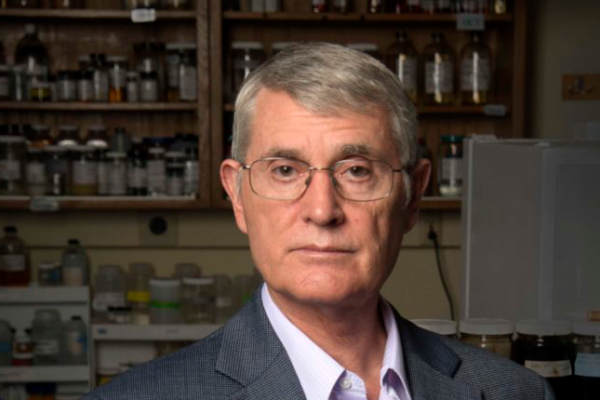Two-thirds of our energy still comes from oil, natural gas and other fossil fuels. When an oil well stops flowing on its own, 70 percent of the well’s total oil is still there, trapped in tiny pores of the rock.
For many years, Gary Pope, a professor of petroleum engineering at The University of Texas at Austin, has been at the center of efforts to get more of that 70 percent out of the rock. This year, the university has named him its Inventor of the Year.
The technology Pope and his collaborators have developed includes both new molecules, more effective in flushing oil and natural gas out of porous rock, and new engineering processes.
At the molecular level, the chemicals must be tailored to the exact rock chemistry and temperature, brine chemistry, oil chemistry and pressure. And when it comes to molecules, this Texas researcher has discovered bigger is better. “We made much larger molecules than had ever been made for this purpose. My first 40 years of working on this, everybody thought the sweet spot was a molecular weight of 400. Pretty soon we were up to molecules that were almost polymeric, a 4,000 molecular weight. That had never been done before. Necessity is the mother of invention. We did that because nothing else was working.”
But the process is equally important — “the way we get inject the chemical, the water we inject it in, how long we inject it, where we inject it, and how we engineer the process to maximize recovery and reduce cost,” Pope says. A different type of chemistry has been used to get more natural gas and associated light oil by injecting solvents and chemicals into existing wells.
Pope has one eye on mining the energy but the other is trained on the environment. “This is environmentally very attractive way of producing oil and natural gas because we’re not talking about risky developments or even new exploration or whatever we’re talking about wringing a little bit of oil out of the rock from existing wells.”
In Texas, an enormous amount of natural gas, mainly methane, is dissolved in hot brine 10,000 to 15,000 feet underground in geopressured, geothermal aquifers. Reaching that brine yields not only natural gas but geothermal energy. Burning natural gas yields carbon dioxide, a greenhouse gas. But it is possible to harvest the energy, then put the brine “right back into the same aquifer, so it can be done in a way that is completely green” he says.
What is even more, Pope’s technology can be used to clean up chemical spills and therefore help purify groundwater. Since World War II, many chemical spills have occurred on military bases, weapons sites, and refineries. “The same technology, the same molecules, the same engineering and process approach has also been used for the cleanup of Superfund sites.”
To make this rock-washing process worth the effort, it must be efficient. “Efficient means you’ve got to combine the engineering and the chemistry and the geology and the physics and the mechanics, and everything has to work together. It is really the definition of interdisciplinary.”
This collaboration illustrates a chief advantage of a university setting. Another is the ability of universities to play the long game. “We can do longer-term things. We can do things that are higher risk. One of the keys to our success is we just kept working on it. We don’t close the lab just because the price of oil goes down for a few years.”
But Pope does not consider invention the greatest legacy of his 41 years on the UT faculty. “The biggest impact I will have are the students who have studied with me and my colleagues. The companies hire them. They understand the science and technology, and they will teach others,” says Pope.
“We’ve been the center of the universe with this technology for years, and I don’t mean because of me but because of all of us,” Pope says. “I’ve been extremely fortunate to have fantastic students and colleagues in petroleum engineering and across campus. I feel like this award is for them as well.”
The Inventor of the Year award is given by UT’s Office of Technology Commercialization.
